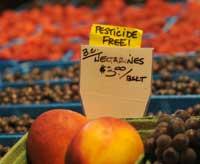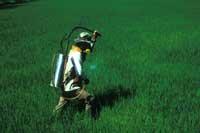Organic are no more nutritious

Well, in an article published in the journal Jorunal of the Science of Food and Agriculture, members of a group of the Department of Human Food of the University of Copenhagen have overturned this belief. They say there is no evidence to say so.
In order to clarify whether the ecological character influences the alimentability, an experiment was carried out. They took carrot, peas, apple and potato plants that grew in three plots. In one of the lands no pesticide was used and its manure was made with manure, that is, its cultivation following organic farming. Another used pesticides and fertilized the soil with manure. Finally, in the third, pesticides and mineral fertilizers were used for plant cultivation. The three plots were contiguous, that is, their characteristics were similar and depended on the same weather conditions. And the harvest was collected at the same time.

After the analysis of the collection, it was observed that in the foods obtained through the three pathways, the nutritious ingredients were presented in similar quantities (the difference was not significant), that is, those produced ecologically were not more nutritious. In addition, this collection fed different animals for two years and evaluated whether the way food grew affected their retention capacity. For this purpose, the minerals that introduced and expelled them were measured. Again, it was observed that there were no significant differences between animals that had eaten food one way or another.
For nothing?There will be more than one stone and one earth, even someone would have been angered by reading the above. How can one say that the foods produced in an ecological way are the same as those purchased in the usual stores?
There is the question. We may have to recognize that foods raised and received at the same time in the same environmental conditions have the same feeding capacity, regardless of the resources with which we have grown.
However, in everyday life we know that food purchased in regular stores, especially fresh products, such as vegetables and fruits, often do not have much flavor and, of course, are much poorer in food. This is so, unlike the experiment mentioned, since in the fruit and vegetable industry, often uncured, food is collected much earlier than those produced ecologically.

By not providing time to heal, the fruits do not produce substances that give them vitamins, smell and taste. They are stored in warehouses and when the time of delivery arrives they are artificially accepted. The priority is production, which must produce as much as possible and have the best possible appearance.
Therefore, the quality of the fruits that hang from your plant and those that have grown artificially in the warehouses will never be comparable. And unlike the fruit and vegetable industry, in organic farming they prioritize the good quality of the products to the production and preservation of the soils where they are raised. Therefore, they do not use fertilizers, pesticides or other products generated in laboratories. And that's why buyers of this type of food have to pay so much.
Published in Deia
Buletina
Bidali zure helbide elektronikoa eta jaso asteroko buletina zure sarrera-ontzian











